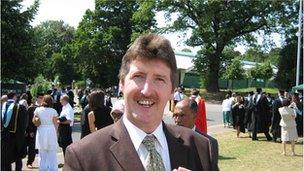The striker's view
- Published
Public sector workers are striking over proposed pension changes. The industrial action could involve up to two million people.
Some of those who voted for the strike have been explaining to the BBC News website why they made their decision and what they expect on Wednesday.
Paul Coyne - Teacher, Bath

Teacher Paul Coyne is joining Wednesday's industrial action
I have been teaching mathematics in good secondary schools for 33 years. Reluctantly I am going on strike on Wednesday although I never thought that I would during my career.
I have come to the conclusion that my professional representatives at ATL have tried their hardest in the negotiations to put across a moderate view about the position of teachers' pensions and this has been continuously ignored and thwarted.
It seems to me that pensions are surely something that can be planned and costed over years so I can't understand how a sudden 50% increase in contributions can be justified.
Isn't it more honest for the government to say that they simply want more income and to narrow the current deficit? That might be an agreeable starting point for negotiations and union leaders might talk about better phasing in of increased costs and then other factors could be looked at.
I think that various related figures should be put into perspective in the debate, for example, that teachers' pensions were increased in 2008 and were considered to be sustainable at that point for the long term. Teachers have had their pay frozen for over two years - how much has that saved?
What about the taxpayers' money (mine included) that the government is putting in to private sector schemes through tax concessions - £38 billion more than into the public sector last year! These items should be brought to the public's attention.
So yes, I will have the day off on Wednesday. I will not be marching or picketing. I will lose my pay. Because I am 55 I understand that the final value of my pension will not be affected by any proposed changes, so I'm not campaigning for my own gain. I am very disappointed that the profession is not being listened to.
Dealing with teenagers is a challenging and rewarding career and I have learned that if they are treated with respect significant progress is generally made. It's a shame that the government don't seem to understand that lesson.
Adrienne Coward - NHS community health manager, High Wycombe

Adrienne Coward says she did not take the decision to strike easily
I have not taken the decision to strike easily and especially find it difficult as I am a clinical manager and feel a duty to maintain services at all times. I am concerned about the impact that striking might have on my future but the need to object to the government's current plans are stronger than any consequences on me personally.
I know that serious strikes 30 years ago achieved enormous improvements in working conditions for those in the NHS. I feel I owe it to those people to make a stand for the generations to come.
My main reason for striking is the wider decisions that this coalition government is making. Locally, we have seen closure of our local Bucks Young People's University, cuts in sports funding (meaning I had to pay for sports clubs at school) and now the huge cuts to local music services which may put at risk an annual performance by Bucks Year 5 children at the Royal Albert Hall.
These are the small things that matter and are symptomatic of the larger decisions being made centrally.
I understand the need to contribute more to pensions and the need to work longer but I do not see why I should get less out as a result. The NHS pension contributions are £2bn in surplus every year and the fund is forecast to be in surplus for the next 21 years.
This government appears to be taxing the public sector to pay off some of the deficit. Why not just increase taxes generally?
At the moment, we have still not received any information as to whether our local school will be shut or not. If I was not striking, either my husband or I would be on standby for the last-minute need to stay at home with the children.
It is not practical for either of us to take children to work with us. On the day, I shall take my children to the picket line at my work place so that they can see that process in action and we shall then go to join the rally outside Wycombe Hospital and join the march through town.
They are very keen to participate as they have seen the impact locally through cuts that local government has been forced to make. We will download banners and take them with us. I hope they will see that as voters we have the right to stand up and object when the government is making choices that we disagree with.
This strike is important to make it clear to the government just how strong the feeling is about what decisions the government is making. The pensions issue is merely serving as a catalyst.
I am faced daily with the challenge of making savings at work by needing less staff and then making those left in the team have to work even harder. I find it a betrayal from Andrew Lansley that he can deny that the NHS is faced with a budget cut and it is this lie which has made it impossible not to strike.
Graham Woodhouse PCS Union rep, Manchester

Graham Woodhouse is organising a picket line in Manchester
On 30 November I will not only be on strike but will be organising a picket line at Piccadilly Gate, Manchester from 07:00. This will mean a 05:00 start for me to be able to catch the first train to Manchester Piccadilly.
Why am I doing this? Because the government is hell bent on raiding our pensions to help pay off a deficit caused not by civil servants and other public sector workers, but by the recession and the bailing out of the banks.
On a personal level this means that the government wants me to pay around £60 per month extra, work for another seven years longer than I have to at present but lose around £800 per year in pension when I eventually retire.
And I am not on a fat-cat salary portrayed by certain parts of the media. My salary is below the UK average. Plus I am in the middle of a two-year pay freeze.
I appreciate that a number of people will be inconvenienced by the action public sector workers will be taking on Wednesday, but when people are making alternative childcare arrangements, waiting in long queues at passport control or wondering when their operation will be rescheduled for they should consider who is really to blame for this action taking place.
It's the government who have decided that changes need to be made to schemes that, following negotiated changes with the previous government, have resulted in schemes that have been deemed to be affordable by the National Audit Office, the House of Commons Public Accounts Committee and even John Hutton himself.
So if you are inconvenienced by the action on 30 November look at who is ultimately responsible for this dispute. Not hard-working public sector workers who are being forced to pay more, for longer, to receive less for their pensions, but a government who would rather threaten and demonise their own workers than negotiate seriously to resolve this dispute.
- Published1 December 2011